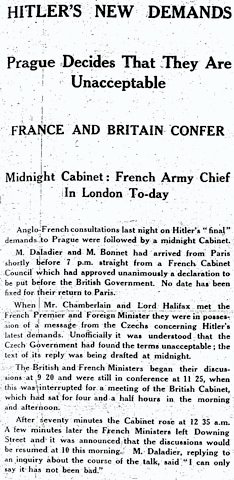
Unfortunately, the situation has deteriorated since Saturday (above, Manchester Guardian, p. 9). Hitler has made new demands which are described by the Manchester Guardian‘s diplomatic correspondent (p. 9) as ‘fantastic’. At Berchtesgaden, a week and a half ago, Hitler said he wanted only those districts where Sudetens were a majority of the population. This was the basis of the Anglo-French plan, to which Czechoslovakia eventually agreed. And now he wants:
The immediate cession of all the territories (with scarcely any considerable exception) where there are Sudeten Germans. There is no longer any question of only such districts where they make up more than 50 per cent. Districts where they are in conspicuous minorities or even where there are no Sudeten Germans at all are included.
These areas are to be handed over to Germany on 1 October, meaning that there would be no time for the Czechs to remove any factories or fortifications. This, the correspondent speculates, is part of the point of the rush. Germany will secure its rear and gain valuable natural resources, factories and military stores. And then Germany will turn west:
She would be able to present another ultimatum, demanding, perhaps, colonies, or the surrender of the Maginot Line, or a “plebiscite” in the Flemish regions of Belgium, and so on. She would be able to back this ultimatum with a vastly superior Air Force, a vastly augmented armament, and almost complete invulnerability. In other words, she would have achieved her maximum of offensive and defensive power in relation to France and Britain.
The Czechs have, of course, rejected this ultimatum. Which, it would seem, means war. Daladier and Bonnet have again flown to London to consult with their British colleagues. Yugoslavia and Romania have promised to support Czechoslovakia if Hungary attacks, under the terms of the Little Entente; but it appears that Poland is to get its territorial demands (Teschen) without a fight (Daily Mail, p. 11). Czechoslovakia has mobilised all men under 40; a million are expected to be under arms by tomorrow (Daily Mail, p. 12).
At home, the news is dominated by the mass distribution of gas masks and the digging of trenches in parks. As the Daily Mail reports (p. 11):
Yesterday will go down in history as A.R.P. Sunday. Until late last night hundreds of thousands were still flocking to schools, town halls and other public buildings all over London and the Home Counties to be fitted for gas masks.
With only eleventh-hour warning to the public and the hastiest of preparations by local authorities, more people were fitted yesterday than during the previous six months: by the end of this week the Home Office expects that practically the whole of Britain will have been provided for.
The public has responded quickly but calmly, which reflects ‘not only the anxiety caused by the European situation but also the sanity and orderliness of the British people’.
The trenches — in London they have been dug in Hyde Park, St. James’s Park, and Green Park, among others — are intended as emergency public shelter, for people who are caught away from home or work during air raids. They are quick and dirty. As a leader in the Manchester Guardian (p. 8) reflects:
The digging of trenches in the public parks of London, Manchester, and other large cities is perhaps the most vivid of all reminders that if war comes the front line will be at home. As a measure of protection against the blast and splinter of high explosive the plan has the merit that it can be resorted to wherever land available, and in this respect those cities which for reasons quite unconnected with defence have provided themselves with “lungs” in their midst have an advantage. Entrenchment, moreover, can be quickly extended if emergency is prolonged […]
But everyone can join in the fun (if they have a backyard, that is, which many of the working class do not). The following (from Manchester Guardian, p. 10) is based on recommendations for a home slit trench: it’s 4’6″ wide at the top and 4’6″ deep.
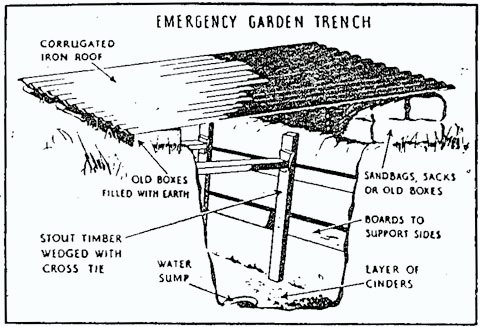
In Whitehall itself, the crowds have exhibited a ‘passive curiosity’, although there were some ‘minor clashes’ resulting in 17 arrests (Manchester Guardian, p. 8; The Times, p. 14). There don’t seem to have been any spectacular outcomes from the two thousand protests planned for the weekend, though a number of speeches are quoted. Colonel Wedgwood, Liberal MP, said at Peterborough (The Times, p. 7):
that Mr. Chamberlain had surrendered to Hitler in vain. The only result had been that Hungary, Poland, and Italy and come into the open as satellite States under Hitler’s wing, determined on their share of the spoils of victory.
Sir Walter Citrine, general secretary of the Trades Union Congress said that the self-determination of the Sudetens is no longer the issue, for ‘This had merely been used as pretext to cover the aggressive intentions of Nazi Germany in Central Europe’. Nobody can be proud of the part Britain and France have played in this, but at least it appears that, at their second meeting, Chamberlain was not prepared to accede to Hitler’s latest demands. Charles White, organiser of the National Council of Action (which National Council of Action, I’m not sure!), told a weekend school (on social reconstruction, not the crisis) in Manchester that he believed that Hitler’s aim was world empire (Manchester Guardian, p.11):
Once the Hitler aim was achieved who could tell how many ages of darkness might pass before the yoke of Nazism was thrown off? It was not improbable that mankind would know ages of darkness comparable to those which followed the collapse of the Roman Empire.
For Leo Amery, a senior Tory backbencher, it’s simple (letter, The Times, p. 13):
Are we to surrender to ruthless brutality a free people whose cause we have espoused but are now to throw to the wolves to save our own skins, or are we still able to stand up to a bully? It is not Czechoslovakia but our own soul that is at stake.
That’s all pretty heavy stuff. To end on a note of absurdity, the Daily Mail describes (p. 10) General Gamelin, the commander of the French armed forces, as a ‘New Napoleon’. This seems unfortunate on several levels, and not only in hindsight!
![]() This work is licensed under a Creative Commons Attribution-NonCommercial-NoDerivatives 4.0 International License.
Permissions beyond the scope of this license may be available at http://airminded.org/copyright/.
This work is licensed under a Creative Commons Attribution-NonCommercial-NoDerivatives 4.0 International License.
Permissions beyond the scope of this license may be available at http://airminded.org/copyright/.


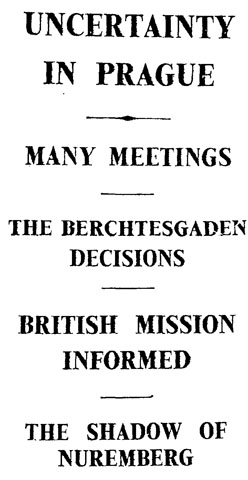
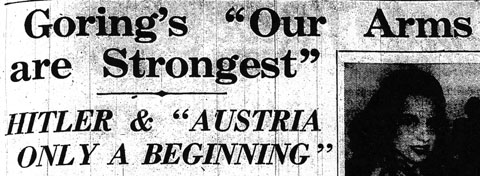
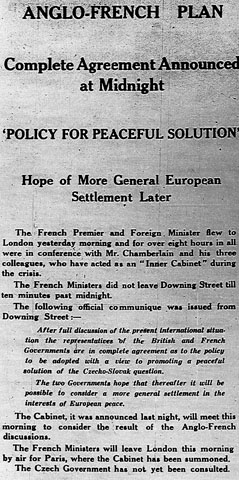
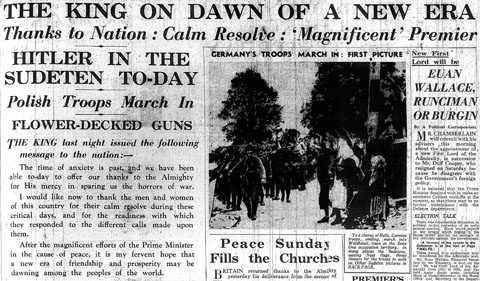
~Flicks through history book looking for ‘A.R.P. Sunday’~ Nope, looks like it didn’t ‘go down as’ after all. Fickle thing, newspaper’s hold on history.
One fascinating thing that’s interesting in this exercise is gathering a sense of the increase and decrease of tension, and the changing tempo of activities, such as mobilisation or ARP activities.
Not to mention Hitler’s ‘grab an opportunity-beyond’ tactics. One is tempted to try, Panto-like shout ‘Look out behind you! He’s a megalomaniac you know’.
I wonder if there was any attempt to analyse the capability of the Luftwaffe against Britain (in public)? The posters and books available to the man on the Clapham Omnibus on the enemy came out in wartime I think, and it seems clear that there was little reliable assessment of real Luftwaffe capabilities in more official or secret circles. It does seem that Goebbels and Goering (good Punk band name that) managed to pull of a very good window dressing job with the Luftwaffe on everyone – while the Luftwaffe was an effective tactical air force, they were certainly reported as to be exponentially more potent as a strategic force than they really were in late 1938 – I’m thinking of numbers, range and bomb load before debatable issues such as defensive capability from fighter and anti-aircraft attack.
For instance, did anyone know if or how much gas the Germans had? If I was in authority in the UK, it would be something I’d be trying very hard to find out – and unlike (say) Japan, there wasn’t such a cultural gulf to stop such critical espionage.
Pingback: Airminded · Tuesday, 27 September 1938
Yes, the term ARP Sunday seems to have disappeared — Google Books seems to have only 1 or 2 mentions of it. The Times used the same phrase.
I don’t recall having seen any analysis of the Luftwaffe’s capabilities like that. Sometimes there are estimates of numbers and more rarely breaking down into bombers vs fighters. The actual aircraft used by the Luftwaffe are very rarely discussed in any detail. The predictions made about German strategy in the next war usually reflected the author’s own ideas more than any actual evidence coming out of Germany.
As for gas, haven’t seen much like that either, but if anyone did it would probably be Desmond Morton’s Industrial Intelligence Centre. The problem with gas, I guess, is that the factories are dual-use — if you took all the factories that could make poison gas and assumed that they were in fact doing so, or might do so in preparation for war, you’d end up with ludicrous amounts. Which I suppose would mean that they could make however much they wanted …
the Daily Mail describes (p. 10) describes General Gamelin, the commander of the French armed forces, as a ‘New Napoleon’.
Well, they were right … it was just that he was Napoleon III, not I.
Ah, that explains it :)
What about Group Captain Winterbotham, later of Ultra fame, who spent the years up to 1938 hanging out with Kesselring, and 1939-40 flying over Germany and Italy in an Electra, taking pictures? He must have had a good idea.
Did the Air Staff have a good take on the Luftwaffe order of battle? And if so, how secret did they keep that knowledge?
Fair crack of the whip! You’re thinking of Sidney Cotton, a fair dinkum Aussie hero. Winterbotham was his handler or recruiter or something.
I’ve just been reading Wesley Wark’s The Ultimate Enemy: British Intelligence and Nazi Germany, 1933-1939, as it happens, and the short answer is: sorta. By the time of Munich they had pretty accurate figures as to numbers of first-line aircraft, but not things like serviceability rates, doctrine, basing and so on. Technical data on aircraft and bombsights and so on was patchy too: e.g. they underestimated the He 111’s range slightly but overestimated its bombload by a factor of 2! Production capacity was overestimated too. All in all the Luftwaffe was thought to be much stronger than it actually was. In 1939 a re-evaulation began to downgrade the Luftwaffe … but that’s another story.
Pingback: Airminded · Post-blogging the Sudeten crisis: thoughts and conclusions